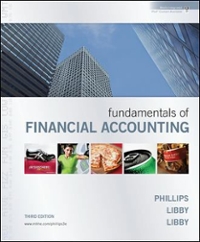Question
You are an experienced faculty member for a US university that conducts graduate-level audit training for auditors from banks, insurance companies and government organizations in
You are an experienced faculty member for a US university that conducts graduate-level audit training for auditors from banks, insurance companies and government organizations in Africa and Asia. The university charges a standard rate of $40,000 for an all-inclusive 3-week training program (instruction, books and materials). Since you already receive a salary from the university (a fixed cost), you do not receive any additional compensation for travelling to those countries to conduct the training, although your air fare, hotel, a generous food allowance of $100 per day and training supplies (all variable costs) are all paid for by the university. You are also allowed to bring your family members on the trips and you genuinely enjoy conducting these foreign training programs. After one program in an African country, you are approached by the local director of training who gives you an interesting offer: in the future, instead of travelling to that country as a representative of the university, you would take vacation time, travel to that country on your own, conduct the usual training program, and receive $30,000 in cash. Since the cost of the air fare, hotel, food per diem and training supplies add up to $10,000, you would be able to pocket $20,000 on your own. You would, however, present yourself as a representative of the university and hand out certificates at graduation containing the official seal of the university. Your initial reaction was to politely refuse, stating that accepting such an offer would violate your employment contract and cause you to be fired. The local director responded by saying "Oh, don't worry, we'll keep this arrangement confidential, no one in the US will ever know." Should you accept this offer? Why or why not?
The concepts "Sales Revenue per unit minus Variable Cost per unit = Contribution Margin" & "Contribution Margin minus Administrative/Selling Expenses = Net Income/ are regularly used by business managers to analyze their costs and determine ways to increase net income. However, in many cases, the sales price of a product is dictated by the market (as explained in the "Pricing: Zappos" video) and companies have already cut their administrative/selling expenses to the bare bones, so the only way to increase net income is by reducing the "variable cost per unit" figure. Reducing variable costs can be done in several ways, most notably by using less expensive ingredients (and possibly decreasing the quality of the product) or by reducing the size of the container. An example of the latter is tuna fish; many years ago, a standard can of tuna fish was 7 ounces, but the size has been reduced to 6.5 ounces, 6 ounces, 5.5 ounces and down to the current size of 5 ounces - thus the manufacturers can charge the same price per can but make more profit. Another example is mass-market ground coffee (e.g. Folger's, Maxwell House, Chock Full o'Nuts), which used to be sold by the pound (16 ounces) but is now sold in 11-ounce or even 10.5 ounce containers (down from 13 ounces a few years ago). Please name three other common food products whose manufacturer has shrunk the size of the contents (or the container) as a way of increasing profits. For example, I can think of a nationally-known beverage available in most convenience stores and gas stations, which recently reduced its container size from 32 to 28 ounces by giving that container an hour-glass shape, while maintaining the same sales price.
Step by Step Solution
There are 3 Steps involved in it
Step: 1

Get Instant Access to Expert-Tailored Solutions
See step-by-step solutions with expert insights and AI powered tools for academic success
Step: 2

Step: 3

Ace Your Homework with AI
Get the answers you need in no time with our AI-driven, step-by-step assistance
Get Started


